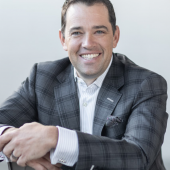It is no secret that hiring is currently one of the biggest challenges facing our industry. More than four million people in hospitality lost their jobs through the pandemic and the estimates show that a quarter of those people will not return to the industry. Combine this with an influx of people leaving their jobs and many other industries searching for talent and you have an uphill battle for catering companies across the nation.
I am consistently hearing that hiring is extremely difficult and is the number one thing limiting the recovery of caterers. When we are faced with significant challenges, we have two choices. We can complain about our situation and seek sympathy from those around us about how difficult it is, or we can choose to innovate and face those challenges head on.

Hiring is one of the most essential functions for businesses. Adding the right people to your team can make the difference between capitalizing on growth opportunities and being stuck spinning your wheels. Bad hiring decisions continue to be the leading cause of turnover within organizations and will cost a company a significant amount of time, energy, and resources. As we navigate the recovery from the pandemic there are a few things we should keep in mind when it comes to attracting and hiring new team members.
Expand the talent pool
Simply posting a job online and waiting for resumes to come in is not going to cut it. Companies must work harder to cast a wider net than they are accustomed to. Hiring is a numbers game and to make sure your talent pool is not full of mediocre candidates you must target passive and sleeper candidates. Let me explain: Those are candidates that are not actively looking for a new job, but open to making a change if the right opportunity presents itself. They tend to be the best new hires and reaching them requires different thinking. Targeted asks for referrals, strong relationships with educational institutions, unconventional partnerships, and exploring the use of a recruiter are all strategies being utilized right now to reach a bigger talent pool.
Creative job postings
Hiring managers need to be more creative as they advertise for open positions. For example, marketing departments are typically tasked with targeting new customers. This is an opportunity to use their skills and expertise to attract new team members. Having the marketing team assist with creatively designing job postings can lead to an ad that stands out among other postings and one that is more likely to be circulated by networks. The marketing department also might be able to help with brainstorming on how to reach the ideal candidates with those ads.
Trust a process
Desperation hiring is a real problem. We are busier than ever, we needed someone yesterday, and we fall victim to hiring the best of what is in front of us—which in a pool of mediocre candidates ends up being the least mediocre. Designing a process for hiring helps to avoid this trap. The process may look different for each position. Hiring a server may be a two-step process whereas hiring an executive chef may have seven steps. Instead of comparing candidates against one another, compare them against the process, trusting that if they make it through all the steps, you are ready to make an offer.
Don’t ask theoretical questions
I like to say that theoretical questions get theoretical responses. Once you have candidates in for an interview, it is important to solicit past examples. They are your greatest predictor of future behavior and performance. Instead of asking, “How would you handle...” or, “What would you do if...,” ask “Tell me about a time when...” or, “Give me an example of a time when you had to....” Once you have asked those questions, do not forget to ask three to five specific follow up questions to ensure your understanding of their story matches what transpired.
Test their abilities
During the last step in the interview process, we like to put a candidate in the job before they are in the job. This may take the form of a cooking interview, a written test, or having them prepare a mock event. Going through this process ensures that they understand what the job entails and that they have the ability to do it at a high level. We also like to include other team members during this portion of the process to get their buy-in and see how the candidate interacts with them. How a chef treats other team members and works in a kitchen is much more important than what he or she prepares during a cooking interview.
See Anthony Lambatos at Catersource 2022 + The Special Event
Don’t miss any of Anthony Lambatos’ sessions during Catersource + The Special Event this May. Learn more at conference.catersource.com.
Finding top talent is harder than it has been in a very long time. In addition to the suggestions above, creating a desirable workplace can be the differentiator that attracts people to your organization. The “great resignation” is also creating “the great attraction” where employees are looking to join companies that will invest in their success, create inclusive environments, and value them as a person. We spend a significant amount of time working with our clients and ensuring our events are executed flawlessly. It’s time we match that investment of time in attracting and hiring new team members.



